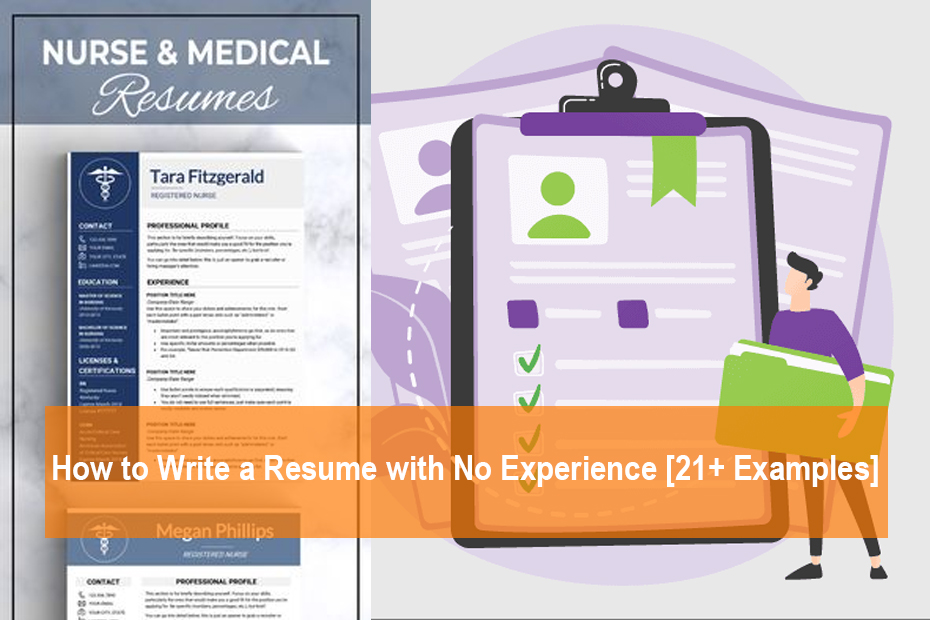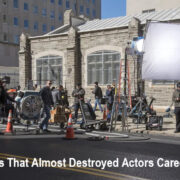How to Write a Resume with No Experience [21+ Examples]
It’s time for your first job search!
You must write a resume; This can be frustrating if you don’t have any real life work experience.
You don’t know where to start, what to include, or what format to choose.
Moreover, most of the advice you find online is not relevant as it focuses on highlighting your professional background.
You probably graduated from college with no experience to speak of.
Or maybe you’re a high school student applying for a part-time job.
Whatever the case may be, you are probably having trouble filling the empty space on your resume that should be the work experience section.
Don’t worry though. In this guide we’ll help you build an AMAZING resume, no work experience required.
You’re going to learn:
- How can you format your resume without work experience?
- 4 sections to replace work experience (help you stand out)
- 2 unemployed experience resume samples (guaranteed to earn you the job)
How to Format Your Resume [with No Work Experience + Examples]
The resume format is the layout of your resume.
The ideal resume format usually depends on how much work experience you have.
But what happens when it’s never there?
We recommend using the reverse chronological format for an inexperienced resume.

Create Resume
It is the most popular format among applicants and a favorite of recruiters.
The sections on your reverse chronological resume will be:
- Header: Contact Information and Resume Statement
- Education
- Internships, extracurricular activities, projects, volunteer work (These departments will replace your work experience)
Skills
In this article, we’ll walk you through each of these sections and explain how to write them so that they stand out from the crowd.
Ready?
Let’s go inside.
Start With Your Resume Header

Your resume title includes your contact information and resume statement.
Below, we’ll show you how to write both of these items and add them to your header section.
Put Down Your Contact Information
As the name suggests, the first thing you add to your headline is your personal and contact information.
The easiest part of getting it right is to be short and to the point.
Mention the following in your contact information section:
- Name and surname
- Phone number
- Link to a professional profile (eg LinkedIn) or personal web page (if available)
Make sure you use a professional looking Email.
So something in the “FirstName.LastName@gmail.com” lines.
If you use an e-mail (“hotshot999@hotmail.com”) you created in preschool, you can be sure that you will make a wrong impression.
Pro Tip
Make sure to double check, triple check your contact information. After all, if your phone number has a typo, the recruiter won’t be able to contact you.
(Optional) Write Your Resume Objective
Resume goal is a short title statement in your resume where you define your professional goals and aspirations.
Fun fact – hiring managers look at your resume for 5-6 seconds at most.
Yes that is right. In most cases, the hiring manager is literally drowning in resumes. So, they have a few seconds to review each one.
Well, this episode is your chance to get their attention (and let them know you have what it takes).
A resume goal is usually no more than 3-4 sentences and includes information on:
- What is your field of study;
- What are your skills and experiences (work related);
- Why are you applying for this position and / or this company?
As with contact information, you don’t need to tag your resume goal with a title. It is enough to write under your contact information section.
Here is an example of what a resume goal looks like:
“Graduate of Final Communication wanting to apply for Secretarial role at XYZ inc. Highly organized with good writing and multitasking skills. Practical experience in management has been gained from a variety of university projects involving coordinating tasks between different team members and keeping everyone in sync with the latest information. ”
Emphasize Your Education

The first part of your average resume will be work experience.
Since you never had one, you’ll want to skip this and replace it with a training section.
This way, you draw even more attention to your education, which is one of your main selling points.
What should you include in the education section?
List the following properties in this order:
- Name of the degree
- Name of the organization
- Years attended
- Location of the institution (optional)
- GPA (optional)
- Honors (optional)
- Related course (optional)
- Exchange programs (optional)
As a general rule, if you study at a prestigious university, you can add the institution’s name before the degree. That way, you’ll get the recruiter’s attention faster.
Clean?
Good!
Now let’s move on to some real life examples:
- If you are a university graduate:
- Computer Science BA
- Tufts University
Medford and Somerville, Massachusetts
10/2015 – 06/2018
Magna Cum Laude
3.87 GPA
Exchange Program in Greenville, NY
If you’re a college student:
University of the Arts London
BA in Interior Design
10/2017 – Ongoing
If you’re a High School graduate:
Westwood High
Boston, Massachusetts
Class of 2018
Education Section Q&A
Do you still have questions about the education section? Don’t worry, we’re about to give you all the answers!
Do I include my GPA?
- The answer here is a “maybe”. We recommend adding a GPA if it’s higher than 3.5. If anything lower than this, you may be underlining yourself. Keep in mind, though, that most employers don’t care about your grades.
Should I include my coursework?
- Yes, but as long as it is relevant. If you do not have work experience, it can help you build your expertise in a field, including courses. Feel free to skip any basics, though. Nobody cares about your Math 101 course.
Do I mention my degree if I dropped out?
- Yes, if you have worked for more than 2-3 years. A half finished degree is better than no degree. If you dropped out after a semester, that doesn’t mean much.
Do I mention my high school degree?
- Only if this is your only degree. If you have any higher education, your high school degree will only take up space.
4 Sections to Replace Work Experience [With Examples]
- Now that you have listed your education, it’s time to fill the work experience gap on your resume.
- You still don’t worry about your inexperience, do you?
- Because here are four sections you can use instead:
1) Internships
Have you done an internship related to the position you applied for?
Now is the time to talk about that.
You will add an internship to your resume as follows:
First, place the Internship section just after the training section.
Title: Internships
Second, write down your internship title and role. Be clear.
If your internship is in the marketing department rather than just “Intern”, say “Marketing Intern”.
Third, write the company name, location and duration of the internship in this order.
/entry-level-resume-examples-2063578-FINAL-1a2753f8f6284c068d69449aa6b793ce.png)
Here’s what you should have so far:
Marketing Intern
Full picture
New York, NY
09/2019 – 12/2019
Easy and straightforward, right?
One more step:
Finally, add a list of responsibilities you have as an intern in bullet form.
Even better if you have any tangible success! Write them down as well.
Finally, tailor both responsibilities and achievements to the task you are applying for.
In practice it looks like this:
You used to be an Advertising Intern. What do I put on my resume if I have no experience?,#What should a beginner resume include?,#What do you say when applying for a job with no experience?,#How can I impress my interviewer?,#How do you answer why should we hire you?,#How do you start off a resume?,#What should a simple resume look like?,#Do I need a resume for my first job?,#How long should a resume be for a job?,#Is it OK to lie in your resume?,#How do you write a resume if you haven’t worked in years?,#How can I get a first job with no experience?,#How do I get my first job?,#What should a first job resume look like?,#How do you introduce your self?,#How do you introduce yourself in a esume?,#What is a simple resume?,#What to say about myself?,#How do you introduce yourself in unique way?,#How would you describe yourself?
Scenario 1
You are applying for the Social Media Assistant position.
You can write your internship application as follows:
Internships
Marketing Intern
Full Picture Company
New York, NY
09/2019 – 12/2019
- Various social media platforms were analyzed for trend content
- Managed company social media accounts
- Increased engagement by 25% by posting interested content on the company’s Facebook page
The listed responsibilities and achievements are directly linked to the Social Media Assistant job requirements.
Scenario 2
You are applying for the Content Writer position. Now take a look at the same entry:
Internships
Marketing Intern
Full Picture Company
New York, NY
09/2019 – 12/2019
- She helped the Marketing Manager write press releases and new blog posts that increased web traffic by 25%.(dişil)
Notice how the internship title stays the same.
But in this case you are applying for a Content Writer position, so instead you emphasize your writing experience.
2) Extracurricular activities
Still have lots of free space on your resume?
- Extracurricular activities are always a great addition!
- Regardless of whether it’s related to the job you are applying for or not, they still show something:
- You are very hard working and motivated.
- Imagine being an HR manager and being able to choose between these 2 candidates:
Josh Johnson. He studied in the State of Massachusetts. A 4.0 GPA, but that was all he did in college – no extracurricular activities, internships or anything else.
Suzie Activeson. He also studied in the state of Massachusetts. 3.2 GPA. Vice president of the business club. He served as a student state senator for 2 terms. She organized various events as part of the marketing club.
Sure, Josh may be qualified, but we know nothing about him except that he’s worked hard.
Suzie, on the other hand, can manage a team (business club vice president), organize events (marketing club), and is passionate about making changes (student government).
So which one would you choose?
Absolutely!
Now let’s explain how to list extracurricular activities on your resume:
- Title of the section: Extracurricular Activities
- Name of the organization and / or team
- Your role in the organization
- Time period
- Notable awards or achievements
And here’s what this would look like on a resume:
Extracurricular Activities
Public Speaking Club
Vice-President
09/2018 – 09/2019
- Organized more than 10 public speaking classes
- Brought speakers from all over the state
- Public speaking workshops
3) Volunteering Experience
Volunteerism shows dedication and passion to practice.
And recruiters love nothing more than a committed employee.
Whether you’re spending your free time in a soup kitchen or helping the countryside pick up garbage, you can mention it on your resume!
But how do you list your volunteering experience? What do I put on my resume if I have no experience?,#What should a beginner resume include?,#What do you say when applying for a job with no experience?,#How can I impress my interviewer?,#How do you answer why should we hire you?,#How do you start off a resume?,#What should a simple resume look like?,#Do I need a resume for my first job?,#How long should a resume be for a job?,#Is it OK to lie in your resume?,#How do you write a resume if you haven’t worked in years?,#How can I get a first job with no experience?,#How do I get my first job?,#What should a first job resume look like?,#How do you introduce your self?,#How do you introduce yourself in a esume?,#What is a simple resume?,#What to say about myself?,#How do you introduce yourself in unique way?,#How would you describe yourself?
Well, it follows the same logic as your internship and extracurricular students:
- Chapter title: Volunteer Experience
- Name of the organization
place - Time period
- Related tasks and achievements (bullets)
Let’s check out an example:
Volunteering Experience
Grand Archive Library Volunteer
Washington, D.C
08/2017 – 02/2019
- He carried out secretarial activities such as sorting mails, filing documents, answering phone calls and receiving messages.
- He organized a poetry reading activity twice a month.
4) Projects
In this section, you can add relevant projects that you were a part of during your time at school or internship.
Your closure project, dissertation or research project go here.
No work experience required!
You can also mention other types of projects you have been working on at school.
- Business project for a real-life client
- The fake website you created in Web Design 101
- Fake magazine you created as a cover project
- Market research that you do as part of your graduation thesis
- Software you developed in the Software Engineering class
…And such that!
Here’s how to write them:
- Chapter title: Projects
- Project name
- Project type
- Relevant organization
- Time period
- Related responsibilities and achievements (optional)
And now, for some practical examples. A journalism student project might look like this:
Projects
Online Privacy and Social Media: a Journalistic Study of Facebook and Cambridge Analytica
Journalism Capstone Project
Harvard University
09/2018 – 11/2018
And here’s a law school example:
Projects
U-Visa
In-House Pro Bono Project
Columbia Law School
11/2018 – 03/2019
- U filed a full petition for non-immigrant status, interviewed legal entities, and prepared affidavits.If you have something physical to back up your project, feel free to add a link.For example, if you’re a developer, you can add a link to your GitHub profile.
Stand out with your Skills

There are two types of skills you can include in your inexperienced resume:
- Soft skills and hard skills.
- What is the diffrence?
Soft skills are traits or habits that define how you work. They are not specific to a job, but indirectly help you adapt to the work environment.
Here are some of the most popular: teamwork, responsibility, leadership, creativity, etc.
On the other hand, hard skills refer to specific tools, technical knowledge and training, and other job-specific skills. They apply for the job directly.
Technical writing, C ++, financial accounting, etc. All are examples of difficult skills.
So which of these skills should you include?
This depends on many factors, but as someone with no work experience, you should rather choose difficult skills.
Look, you can type all the cool words like “Critical Thinking” and “Leadership”, but the recruiter won’t believe you.
Fun fact – 90% of students do this.
Instead, you should focus on the skills that make you stand out, and in most cases these are difficult skills.
So how do you decide which hard skills to talk about? Easy! Just check the job post you applied for.
Let’s say you are applying for an entry-level creative internship and you find these requirements in the job description:
- Video editing experience (Premiere, After Effects)
- UI design experience
- Photo editing experience (Photoshop)
- Photo experience
- Experience with Adobe Illustrator
You transfer this to the skills section:
Skills
- Premiere and After Effects – Expert
- Photoshop – Expert
- UI Design – Medium
- Adobe Illustrator – Medium
- Photography – Intermediate Level
Not sure what skills to talk about? Check out our article on over 150 must-have skills for all types of professions!
Other Sections You Could Include in a No-Experience Resume
An inexperienced resume has one advantage: extra space.
You can use this space to create other sections that emphasize how awesome you are!
Some of the sections you can add are:
- Hobbies and interests. Add flair to your resume by showing your true passion and interest in the industry.
- Languages. Do you know a second language? Or a third? Great! Most companies these days are very international and appreciate an extra language skill or two. However, be careful not to overestimate your competence. Only “¿Donde está la biblioteca?” It does not guarantee a Spanish entry in your resume.
- Awards and Certificates. Do you have any fancy paper that shows you are smart? Perhaps a prize for a great article in a competition or a certificate from an online course. Whatever the case may be, awards and certifications show that you are a winner, so definitely include them in their respective division.
Need Inspiration? 2 No Work Experience Resume Samples
Do you still have questions or don’t know where to start?
That’s when a resume sample works.
It provides you a predetermined format.
It also helps you imagine what your inexperienced resume should look like.
As Picasso says: Good artists copy; great artists steal!
Here are 2 examples of non-work experience resumes you can borrow ideas from:
Business Student Resume Sample

High-school Student Resume Sample

Create a Matching Cover Letter
Is your resume finished?
Not finished. You have to write a cover letter to go with it.
The cover letter is a one-page letter that accompanies your resume and is part of your job application.
Look like this: your resume describes your experiences and your cover letter (in simple words) explains how relevant they are to the job.
Now, a quick infographic on what to include in the cover letter:

Finally, as with anything else on your resume, make sure you keep your cover letter relevant, concise and concise.
The hiring manager does not have time to read an autobiography, he will simply review your cover letter for a few minutes.
There’s a lot more to creating a good cover letter than we just explained.
Check out our Complete Guide to Writing Cover Letters for a complete review of everything you need to know!
Key Takeaways
… and this is a pack!
At this point, you should know everything you need to know about writing an inexperienced killer resume.
To keep things fresh though, let’s quickly go over everything we’ve learned so far:
- Use the reverse chronological format when creating your inexperienced resume.
- Instead, you can create a killer inexperienced resume by emphasizing your education. Include relevant internships, soft and hard skills and projects.
- Other sections you can add to your resume are hobbies and interests, languages, certificates or achievements.
- Keep all the content on your resume clear, precise, and relevant. Use bullets for all your comments.
- After you’ve finished your resume, you’ll want to write a great cover letter with it. The cover letter is a one-page letter that tells the story behind your resume content and re-emphasizes why you are well suited for the job.














Comments